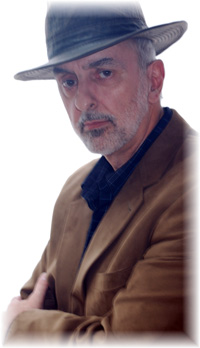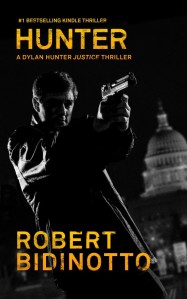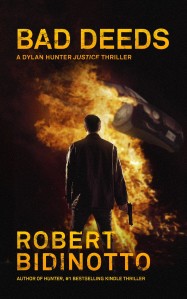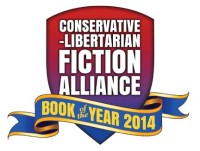Photos by Brian Killigrew
In Part 1 of this interview, Vince Flynn recalled the long struggle that culminated in his becoming a best-selling author of riveting political thrillers. He also revealed the origins of his iconic counterterrorism hero, Mitch Rapp.
In Part 2, Vince explained the “individualism” underlying his personal and political worldview; his perspectives on novelist-philosopher Ayn Rand; and his thoughts about Islamic-based terrorism, which is the main focus of his novels of international political intrigue.
In this concluding installment, Vince discusses the political biases in Hollywood that so long stymied the adaptation of his popular novels to film; his controversial views on the use of “extreme measures” against captured terrorists during interrogations; and the art and craft of writing thrillers.
The photos for the interview were taken by Brian Killigrew.
~*~
The Vigilante Author: Now, [Protect and Defend] is your ninth book. All bestsellers—and none of them have been optioned by Hollywood. [Note: This was true as of the date of the original interview in 2007. However, CBS Films has optioned and is developing Vince’s books for movies, starting with his most recent “prequel,” American Assassin.]
By contrast, we have had Redacted, which made about $25,000 and had maybe 3,000 people see it. I had more people go to my blog yesterday than went to all of the theaters to see Redacted. But Hollywood has made movie after movie after movie of this kind; and the only theme they have in common is that America—its symbols, its military, its government—is the bad guy. As long as you portray America as the bad guy, it will fly in Hollywood.
Flynn: Yes. That’s the type of movie that Hollywood wants to make. And it goes back to this same thing: We’ve lost our moorings to our moral underpinnings in this country. Hollywood is an industry where people live and die by what other people think of them. They want acceptance; they want the Oscar; they want ticket sales; they want people to think they are smart and that they care and are compassionate. So they go to all of these parties with all of these like-minded people, and they all talk about “diversity.” “Look, we have a white man, a black man, a Hispanic, a woman—we’re very diverse.”
Well, you know what? In my colorblind mind, you have no diversity there if you all agree with each other. Real diversity is having people who think differently and getting them together and trying to find solutions. But Hollywood is filled with a bunch of like-minded sycophants right now, who all think the same way.
The Vigilante Author: It’s infuriating to me.
Flynn: [My series] has become too valuable of a commodity, so now, they are in this game of chicken. They don’t agree with the books; they don’t want to make a movie and have their friends give them crap. They are afraid that the Muslims might get upset if they make a movie that really goes after Islamic radical fundamentalism. But they are still looking at [producing] it, thinking, “My God—business-wise, this might be a really good decision. No one has bought the rights to this damn thing yet; and he’s got one of the biggest audiences of any fiction writer in the country. How much longer can we ignore him?”
The Vigilante Author: Yes. It’s just like Jack Bauer [the anti-terrorist agent on Fox TV’s long-running “24”]. “24” has gotten protests from—
Flynn: —the Council on American Islamic Relations. Yes, they don’t like “24,” and they don’t like me.
The Vigilante Author: So they’ve tried to make the show more acceptable by featuring a lot of non-Islamic terrorists. I’m waiting for Scottish terrorists to show up on “24.”
Flynn: It drives me nuts.
The Vigilante Author: The most controversial thing associated with your novels is the fact that Mitch Rapp will torture terrorists or do anything that he needs to do to stop them. That was especially true in your novel Protect and Defend, where the whole resolution hinged on it. But many people regard torture as intrinsically evil—just like pacifists regard war as intrinsically evil, no matter if it’s for self-defense or whatever.
Flynn: Torture—it’s just a nasty thing. It’s not good; it’s not nice.
The Vigilante Author: So are flamethrowers.
Flynn: Yes. Here’s where I sit. It’s real simple. If al Qaeda signed the Geneva Convention, put on a uniform, stuck their flag in the ground, and said, “Let’s meet on the battlefield,” I would say: “Absolutely. Torture—you can’t do it. Period. End of discussion.” But we have an enemy that won’t put on a uniform, has not signed the Geneva Convention, hides behind men, women, and children, and then attacks men, women, and children—civilians.
I think it’s a joke that we are even having this debate, as a nation. I think that torture should take place only for high-value targets where we know they are withholding information that could help us bust up cells, financing, organization, and possible operations.
The problem is that because we are a civilized society, and because we’ve lost our mooring—we’ve lost our attachment to our Judeo-Christian beliefs—we’ve gone off on this little safari with PC. We think that we have to say things so that people will think, “He’s smart, he’s compassionate, he cares, he’s got a good heart.” The reality is that if you were to ask the American people, “When Mitch Rapp starts to torture some bad guy who knows where the nuke is, are you sitting there in the privacy of your home crying and saying, ‘Please stop torturing this guy’? Or are you saying, ‘Get him, Mitch! Get the information out of him!’”
The Vigilante Author: Right. And I think that is one of the appeals of the character. He doesn’t let anything stand in the way of justice.
THE WRITING CRAFT
The Vigilante Author: I did a piece on my favorite thriller writers and said that you give me the feeling that I’m peeking in the keyholes at the CIA and the White House. Obviously, you’ve developed all kinds of high-level sources now; but even very early on, in Term Limits, you included a lot of “trade craft.” How did you learn that stuff?
Flynn: I think I am blessed with the ability to get people to trust me. Part of it is when I give my word, people know that I mean it. And I never realized until much later how competitive I was. What saw me through a lot of the down times was me just not quitting, because quitting wasn’t an option. The dogged determination to find these people, talk to them, network, go out and have beers with them, and shoot the bull.
The Vigilante Author: You did that before Term Limits then?
Flynn: Yes, while I was doing research for Term Limits. My brother Timmy, who is a St. Paul cop, caught a bank robber one time. Through him I met some guys at the FBI, and through them I met some other people. I’m bartending in St. Paul and a buddy of mine was the big Miller distributor in town. He says, “I’ve got a buddy who I went to college with who is in the United States Secret Service. You should talk to him, he is in town for Christmas.” So we went out and had drinks and hit it off.
Writers are storytellers, and you endear yourself to people if you are a good storyteller. Growing up in my house, you would sit around the dinner table with no TV on, and you just listened to mom and dad and my grandma and grandpa tell stories.
The Vigilante Author: It’s an Irish thing, too.
Flynn: I don’t think it is by accident that a lot of Irish Catholic authors have had a lot of success.
The Vigilante Author: I assume that at a certain point you vet some of the sensitive stuff past these sources and say, “Have I screwed up?”
Flynn: And I’ve had them come back and say, “You are too close—you’ve got to take some of this out.”
The Vigilante Author: You said you try not to read reviews. Why?
 Flynn: If you ask someone to review a book, they are going to find its faults. Reviewers, a lot of them, tend to be frustrated writers who don’t understand the proper way to review a book—especially the New York elite reviewers. The good reviewers do the same thing that the Cannes driver does. They don’t test a Ford pickup truck against a Porsche 911. They put the sports cars in one category, the sedans in the other, the SUVs in another. And the good reviewers will judge a thriller as a thriller.
Flynn: If you ask someone to review a book, they are going to find its faults. Reviewers, a lot of them, tend to be frustrated writers who don’t understand the proper way to review a book—especially the New York elite reviewers. The good reviewers do the same thing that the Cannes driver does. They don’t test a Ford pickup truck against a Porsche 911. They put the sports cars in one category, the sedans in the other, the SUVs in another. And the good reviewers will judge a thriller as a thriller.
A thriller is supposed to be a sports car: It’s not going to be judged for its luxurious ride and flowery character descriptions. It is action—keep the pages turning. The few reviews that I have read [about] me will say, “Really lax in character development, blah, blah, blah.” Well, guess what? I start doing Snow Falling on Cedars–type character development, my book gets three times as big as it is, and I will put your ass to sleep in five minutes. I get better feedback from my fans.
The Vigilante Author: Lee Child was of the opinion that all stories are character-driven.
Flynn: Lee and I part ways on this a little bit. Lee designs his novels around the character or what they are going to do. I do some of that; but also, for me there has to be this geopolitical hook. I write in kind of a different area. Lee will write very localized, good guy/bad guy stuff, a local city. I am trying to write more of the national political stuff. So I’ve got to think like I’m going to shoot a movie. That’s how I start a book. I start thinking: Where are some of these big scenes going to take place? Is it going to involve Special Forces, FBI—who is going to be involved? Who is going to be shooting and killing? So we come at it slightly differently.
The Vigilante Author: His are cinematic too, but the nature of the conflicts is different.
Flynn: Part of the gift, at least for me, is the ability to look at a puzzle that is missing half of its pieces and fill in the picture. I think a lot of writers have that gift. Like Lee—we think a lot alike, in the sense that we are very linear. And Lee is very good about understanding place and time, and how he has to move his characters from one place to another—hard geographic locations—and then describing those locations and creating a sense of urgency.
I also think that writers who are filled with self-doubt and loathing can’t write a book a year. It’s not going to happen.
The Vigilante Author: No.
Flynn: No way. You have to have a certain level of confidence. And you can’t complicate it. I say this all of the time: It’s not that complicated. People look at me and go, “Yeah. Right.” I just say, No, it isn’t.
Rule number one: Understand who your audience is. Who are you trying to reach?
 It’s a huge marketplace. Am I trying to write a book that sci-fi fans want to read? No. If they happen to read it and like it, great; but that is not my audience. So always remember who your audience is. And then from there, relax. Focus on pacing; get the details right, the research; and write a great page-turner.
It’s a huge marketplace. Am I trying to write a book that sci-fi fans want to read? No. If they happen to read it and like it, great; but that is not my audience. So always remember who your audience is. And then from there, relax. Focus on pacing; get the details right, the research; and write a great page-turner.
Here’s a baseball analogy. These players, when they are hot, are not thinking about their swing. They step up to the plate; they might think, “Tuck that right elbow in right before the ball is delivered.” There might be some little key to get your weight going in the right direction. But by and large, they are stepping into it, keeping that back elbow up. They are not thinking, “Am I breathing in or out? And what I am doing with my left toe? Am I going to step into the plate—”
The Vigilante Author: I am going to shock you. I don’t know whether you read my Lee Child interview, but he used exactly the same baseball metaphor.
Flynn: Oh, you are kidding!
The Vigilante Author: He used that baseball metaphor. He was talking about exactly the same thing—self-consciousness and how it kills you. He was saying that you can’t be thinking, “Well, I have to please this demographic or that demographic.” You know who your audience is; but then it’s just communicating with that person, and you can’t be self-conscious.
Flynn: Well, you can go too far. If you become so self-absorbed that you are saying to yourself, “I’m so liberated, I don’t need to think about my audience; I’m just going to write.” Now, there are a lot of great writers who write great books, from a technical and creative standpoint, and they lose their audience because they want to “grow.” You see it with musicians every once in awhile. They want to do their kind of music, and then they go and make—
The Vigilante Author: Something inaccessible.
Flynn: It’s narcissistic. The studio, the label is telling them that this isn’t going to sell. So you have to make a choice. I’m 41. I’ve got three kids I have to send to college. I am a capitalist, an individualist, and I enjoy making money. So if I want to make more money, I have got to keep perfecting what I’m doing—or, at the bare minimum, keep that level of performance. I’ve got to bat .300 every year. It’s not complicated; why screw with it? If you’ve gotten .300, you’re going to the Hall of Fame.
The Vigilante Author: Right.
Flynn: So why would you all of a sudden decide to change your stance or something? So I don’t. Now, am I going to write about Mitch Rapp forever? No, but I’m not going to go write the feel-good romance novel.
The Vigilante Author: I’m heartbroken.
Seriously, I think your characterizations have grown over time, significantly. The focus at the beginning was more action. But now, the depth of the characterizations—you’ve said that you had tears while writing what happened to a character in one novel.
Flynn: Consent to Kill.
The Vigilante Author: So, what do we have to look forward to next?
Flynn: The Grinder—that’s the working title.
The Vigilante Author: The Grinder?
Flynn: Didn’t I ever tell you my story about the grinder? I went to dinner with the president of Hormel Foods, who grew up working in the slaughterhouse in Austin, Minnesota. He said he wanted me to come down and tour the slaughterhouse. I said no—I like my sausage; I don’t want to see how it’s made.
The Vigilante Author: So there is a metaphor going on here.
Flynn: The meat grinder. And Rapp plays a minor role.
The Vigilante Author: So this is a Scott Coleman—
Flynn: Scott Coleman is going to be in it, and [CIA Director] Irene Kennedy.
The Vigilante Author: We’re going to have to see how you’re going to make Irene recuperate after what you put her through this last time.
Flynn: People want her to find a love.
The Vigilante Author: Yes, well, that is tricky.
Anyway, thank you, Vince. This has been great.
~*~
Note from The Vigilante Author:
Since this interview was first published in the spring of 2008, Vince had further writing triumphs, including Extreme Measures [the novel described above as The Grinder], Pursuit of Honor, American Assassin, Kill Shot, and The Last Man.
However, to the shock of his many fans, Vince announced late in 2010 that he had been diagnosed with Stage III prostate cancer. On October 4, 2011, he issued a public statement updating his condition, reporting that his treatments were going well, and that after they concluded, the prognosis looked good.
But in June 2013, Vince Flynn finally succumbed after his heroic and stoic battle with cancer. Several thousand mourners attended his funeral at his Catholic church in St. Paul to celebrate his life. I know I speak for untold numbers of fans and fellow authors worldwide in grieving the loss of a great writer and an even greater man.
Today, his Mitch Rapp series is being continued by thriller author Kyle Mills, with The Survivor, to be released in 2015.
For more about Vince Flynn and his work, visit his website.
(This interview was first published in the March 2008 issue of The New Individualist, (c) 2008 by The Atlas Society, and is reprinted with permission.)



 Photo (c) by Debbie Scott
Photo (c) by Debbie Scott




